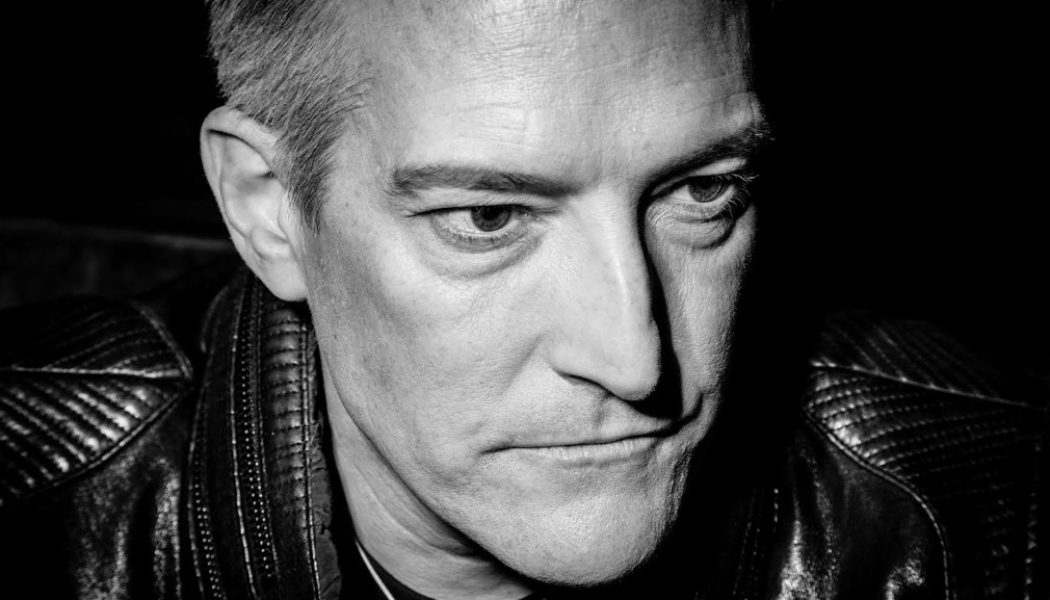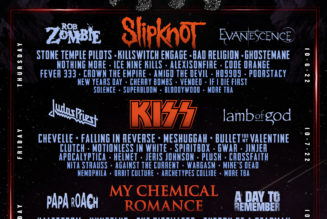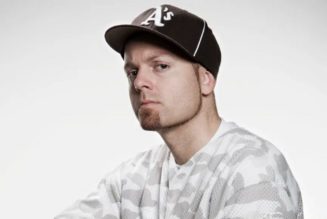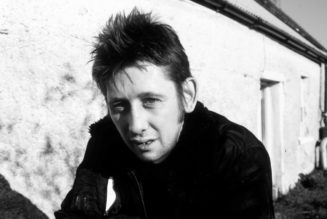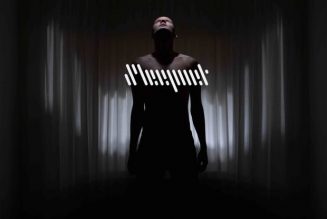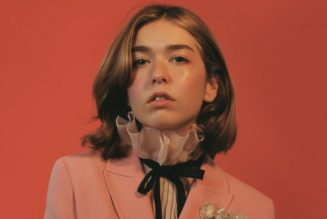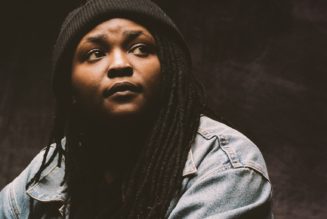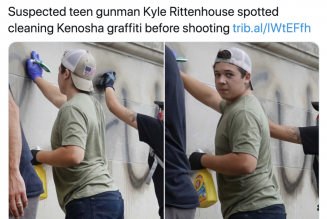
‘I had taken a risk that I was going to make it on my own, and not gain notoriety as the guitar player for Nine Inch Nails anymore.’
Richard Patrick spent the last weeks of the winter of 1994 with Ben Grosse at Pearl Sound in Canton, Mich., overseeing the final mixes for what would become his vitriolic industrial outfit’s inaugural offering, Short Bus. Cut off from the outside world, with his focus squarely on finishing his 1995 debut LP, the Filter frontman had no idea one of the unfinished record’s tracks was already in heavy rotation at rock radio stations nationwide thanks to a last-minute request from the producers of the soundtrack for an underknown Billy Zane-anchored horror film.
The song, of course, was “Hey Man, Nice Shot,” which appeared in Tales From the Crypt Presents: Demon Knight, and later went on to become Short Bus’s lead single. It is the second-to-last track on the movie soundtrack, which landed on store shelves on Jan. 10, 1995.
“It was one of those songs where everyone was like, that’s undeniably a massive hit,” says Patrick, speaking to Billboard about the track and Short Bus, which marks its 25th anniversary May 8. “[Nothing Records co-founder and one-time Nine Inch Nails manager] John Malm told Trent [Reznor], ‘I don’t know much about music, but ‘Hey Man, Nice Shot’ is a f–king massive hit.’ Everyone kind of knew that was the situation. I knew it, too — in my bones.”
On a drive from Michigan back to his native Cleveland, Patrick tuned his radio to WMMS, he recalls.
“When I heard the ‘Top 5 at 5’ — they would play the top five songs at 5 p.m. on WMMS — and they said that Filter had the most requested song, I was like, ‘What?’” Patrick says. “I called my friend Scott Kern, who was like, ‘You don’t know about this? While you were mixing the record, [‘Hey Man, Nice Shot’] f–king took off and went crazy … so, I’ve been hearing your crazy-a– voice every day for the last f–king month and a half!’ All I could say was, ‘Wow.’ All of sudden, it turned into this huge f–king success, and I was really, really excited and happy — and vindicated.”
Two years earlier, Patrick had relinquished his post as Nine Inch Nails’ guitarist. “For the longest time, I was like, ‘I hope I did the right thing,’” he says. “Trent was asking me to stay on for another tour, and I was just convinced that this was the only time I could really just escape and try my own thing. I had taken a risk that I was going to make it on my own, and not gain notoriety as the guitar player for Nine Inch Nails anymore. I had some f–king great songs, and I had specifically asked the record company not to promote the fact that I had been in Nine Inch Nails. I told myself, ‘You’re done riding Trent’s coattails. You are gonna make it on your own.’”
Patrick would later learn “Hey Man, Nice Shot” was one of only two new, previously unreleased tracks on the Demon Knight soundtrack, and that a radio promo rep at Atlantic, hawking the compilation to stations, had convinced a disc jockey in Colorado Springs to spin a cut off it. The DJ chose Filter’s now iconic tune, playing the song “at 2 in the morning, and it went crazy — it went viral,” the singer explains.
[embedded content]
Soon afterward, the release of Short Bus was fast-tracked in order to capitalize on the song’s swelling popularity, which came at a time when guitar-laden abrasive rock like Filter’s was at its most marketable. The single hit No. 10 on the Alternative Songs chart, while Short Bus peaked at No. 59 on the Billboard 200, and has since gone on to sell more than 1 million copies in the U.S. alone.
Intense, explosive, and emotive, Short Bus was a brooding, contentious collection of industrial-guided anthems teeming with melancholic melodies, blistering metallic riffs, and crushing distortion — all punctuated by Patrick’s incensed vocals and cynical lyricism. Patrick wrote the record’s songs in his parents’ basement, collaborating with longtime friend Brian Liesegang (another early contributor to NIN) to fine tune and ultimately track them.
ADATs, AK-47s, and Alcohol
First, the pair tracked a four-song demo inside Patrick’s squalid apartment — located in one of the crustier sections of Hollywood — using an eight-track, a drum machine, a sampler, and a Macintosh SE. Patrick sent the demo around to all the labels, attracting the attention of Reprise A&R rep Mike Ostin.
“When he signed me, he came over to my seedy-a– Hollywood apartment from Beverly Hills, sees I have this eight-track and all this stuff, three woofers I’d stolen from my dad, and these Realistic speakers, and my cat had nibbled on the cone of one of the speakers,” Patrick recalls.
“He said, ‘You did your demo with this gear?’ And I’m like, ‘Yeah,’ and he’s like, ‘I wanna sign you right now. I’m not even gonna wait — I know you’re fielding other offers,’” the rocker tells Billboard. “Mike was extremely generous, and he realized that I was very happy in my room with my eight-track and my drum machine. So he gave me this blank check, like, ‘Hey, go pick out a bunch of gear and don’t get overwhelmed, but like, just go make a record because your demo sounds great’ — and we produced it ourselves.”
The majority of Short Bus was tracked in a three-story house Patrick and Liesegang — who left Filter in 1997 — rented in the Cleveland suburb of Rocky River. There was a retirement home next door, the singer says, and by the time the duo was through with the recording sessions, the home was destroyed.
“They f–king leveled the house after we left and they used the property to add on to the nursing home,” Patrick says. He adds that over the course of the eight months it took to record the album, a friend of his utilized the residence’s basement “to store a bunch of his AK-47s and his ammo crates. We were next door to these old fogeys, living in a house filled with beer, guns, and recording equipment.”
According to Patrick, those guns belonged to Matt Drvenkar, whose voice can be heard on Short Bus in the answering machine message at the beginning of “Spent.”
“Matt was my ex-girlfriend’s boyfriend, and he was just this incredible, enthusiastic, charismatic person who was, at that time, falling through the cracks of society,” Patrick explains. “Other than dating the same girl, we had something in common — we liked to party. We would climb bridges, or sit around, smoking cigarettes and drinking, listening to music and shooting the s–t.”
The answering machine message, which was like the dozens Drvenkar left for Patrick, made the Filter guys laugh “hysterically,” he tells Billboard, insisting the song isn’t a critique of his drinking buddy. “It was no reflection on him, because he’s this really cool person,” Patrick explains. “The only difference between me and him was luck. I mean, come on, dude: I walk into Pi Keyboards and Audio and I meet Trent Reznor, and him and I go on tour. … It could have been so different for me.”
[embedded content]
With Reprise’s money, Patrick and Liesegang invested in guitar racks, ADAT racks, drum machines, and a refrigerator that was packed at all times with Drummond Bros. beer. “It took so long to set up the equipment — which we didn’t know how to use — and the record company showed up early on, trying to get me to play them some new music,” Patrick explains. “But I didn’t have anything new … so we just played them the demo again, and they were like, ‘This is f–king great! It sounds better than the demo!’”
Short Bus’s Two Sides
In between bouts of drinking, Patrick and Liesegang brought Short Bus to life, with Patrick playing the bass parts and providing the vocals, and Liesegang helming most of the production and programming. Both musicians shared the album’s guitar parts. Over the course of the recordings, some of the songs morphed.
“I allowed myself to be creative and do different arrangements of stuff,” Patrick — sober now for nearly 18 years — says. “Take the song ‘Under.’ That track has this break right in the middle of it, and the reason is my godd–n wrist got so tired of playing sixteenth notes on the bass that I, like, stopped for a second, and I realized, ‘Well, this is a great place to punch in here,’ and I started playing again.”
He adds: “That stuff didn’t happen once I got the computer. All of a sudden, with the computer, it became, ‘Oh, we can write verse, chorus, bridge, verse, chorus, bridge, so there were two different characteristics to the record — before and after the computer.”
Half of the album, including the songs “Gerbil” and “White Like That,” were recorded on eight-track, while “It’s Over” and “Consider This” were tracked with a computer. “I ended the record with ‘So Cool’ because I wanted people to know that, you know, I will mellow and I will have some softer stuff,” Patrick says. “Everything was laid out on the table — there was nothing left.”
The unassuming cover art was produced by graphic designer Deborah Norcross.
“I told her, ‘I’m not sure I wanna follow the f–king ‘goons in black on the cover’ formula,” he recounts. “I told her that I really loved the generic feel of [1986’s] Album by Public Image Ltd., where it was just ‘Album,’ you know? Instead of saying ‘Filter is an industrial band that wears black,’ let’s just say that the music will be the product, and the product will speak for itself.”
Contrived Controversy
Weeks before the album’s May 8, 1995, release and feeling good about the work he’d done, Patrick found himself fortuitously caught in the crosshairs of controversy, thanks to “Hey Man, Nice Shot.” Some DJs started speculating the song was a demented knock to Nirvana’s Kurt Cobain, and that Patrick was callously mocking the grunge great, who died from a self-inflicted gunshot wound the previous year.
“It was very painful,” Patrick recalls. “All these DJs — especially the ones from the Seattle stations — were saying, ‘Bulls–t, Rich … we know the song’s about Kurt.’ And for years, I walked around, going, ‘Holy f–k! People are getting the wrong idea about this song.’ You know, you write a song in your mom and dad’s basement, and all of a sudden, Nirvana fans are like, ‘Why are you talking about this s–t,’ and … it was just painful, man.”
Reprise responded to the backlash by leaking the true inspiration behind the track, which Patrick wrote in late 1991: the very public 1987 suicide of then-Pennsylvania State Treasurer R. Budd Dwyer, who shot himself in the head with a revolver during a news conference. Dwyer’s suicide occurred the day before a judge was set to sentence him in his bribery-conspiracy case, in which he was convicted of 11 counts, including conspiracy, mail fraud, perjury, and interstate transportation in aid of racketeering.
“I remember seeing the footage on the news when it happened, but then didn’t think much about it until Lollapalooza,” explains Patrick, who was part of the festival’s 1991 inaugural lineup as a member of Nine Inch Nails. “On one stop, there was this little booth that was selling books, and they gave me this weird video tape — I still have it — that wasn’t Faces of Death, but it had footage from that press conference.”
Patrick tells Billboard he returned to Ohio after the NIN tour and popped the tape into his VCR. “It was just kind of one of those things where it was like, ‘I get that you were pissed, and killing yourself must take so much … either strength or insanity,’ but — you know, I’ve got friends who’ve killed themselves — and I was just like, ‘How does one even do that?’” he says. “I don’t mean strength, like, strength, but more the will to totally f–king kill yourself. The song is about suicide, but more about, like, ‘How does one actually pull the switch?’”
According to Patrick, the public misperception over “Hey Man, Nice Shot” would disturb him for years. “I eventually talked to [Nirvana’s] Dave Grohl and Krist Novoselić about it and I assured them it wasn’t about Kurt,” he says. “I told them I wasn’t trying to profit off of anyone’s death, and that there’s a phenomenon known as suicide and people do it — that I wanted to kind of understand it, and raise the intellectual question of, you know, to be or not to be and that whole thing.
“When Dave and Krist understood that, and I could look them both in the eye, that’s when I felt completely OK about it.”
Twenty-five years after Short Bus was unleashed on the world, Patrick — who claims he’s “overweight and gray” — says he’s “happy as hell,” and “still so grateful” for the success he has enjoyed over the course of his career.
“I will look on YouTube, and ‘Hey Man, Nice Shot’ is up to 12 million views. So it’s like, ‘Hey, 12 million people from around the world have listened to this. I did it!’” Patrick notes. “I will never forget what [ex-girlfriend and onetime Smashing Pumpkins bassist] D’Arcy [Wretzky] told me once, because, when you’re depressed and an alcoholic, you’re constantly hard on yourself and beat yourself up.
“She’s like, ‘You did something impossible. You quit a big band and you made it, like, legitimately on your own, and you should be proud of yourself,’” recalls the musician. “She’d remind me that I did something that was pretty impossible, and so … I don’t ever forget that.”
